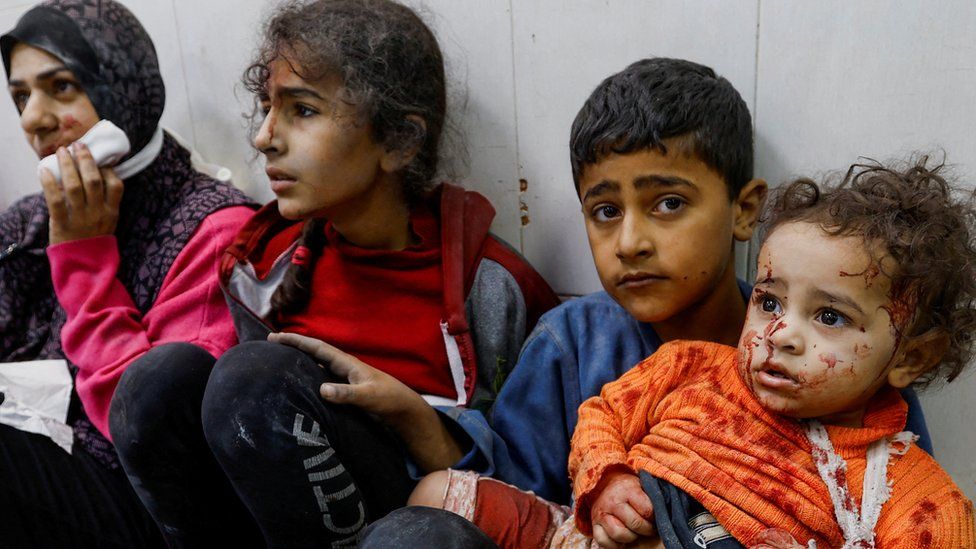35 minutes ago
About sharing
A senior UN aid official has warned that half of Gaza’s population is starving, as fighting there continues.
Carl Skau, deputy director of the UN World Food Programme, said only a fraction of supplies needed have been able to enter the Strip – and nine out of 10 people cannot eat everyday.
Conditions in Gaza have made deliveries “almost impossible”, Mr Skau said.
Israel says it must continue air strikes on Gaza to eliminate Hamas and bring Israeli hostages home.
Israel Defence Forces spokesman Lt Col Richard Hecht told the BBC on Saturday that “any death and pain to a civilian is painful, but we don’t have an alternative”.
“We are doing everything we can to get as much as possible inside the Gaza Strip,” he said.
Movement in and out of Gaza has been heavily restricted since 7 October, when Hamas fighters broke through Israel’s heavily-guarded perimeter fence – killing 1,200 people and taking 240 hostages.
In response, Israel closed its borders with Gaza and began launching air strikes on the territory, restricting aid deliveries which Gazans heavily relied on.
The Hamas-run health ministry says Israel has killed more than 17,700 Gazans in its retaliatory campaign, including more than 7,000 children.
Only the Rafah crossing bordering Egypt has been open, allowing limited quantities of aid to reach Gaza. This week Israel agreed to open the Kerem Shalom crossing from Israel into Gaza in the next few days – but only for the inspection of aid lorries. The trucks would then go to Rafah to cross into Gaza.
Mr Skau said nothing had prepared him for the “fear, the chaos, and the despair” he and his WFP team encountered during their trip to Gaza this week.
They witnessed “confusion at warehouses, distribution points with thousands of desperate hungry people, supermarkets with bare shelves, and overcrowded shelters with bursting bathrooms,” he said.
International pressure and a temporary seven-day ceasefire last month had allowed some badly-needed aid to enter the Gaza Strip, but the WFP insists a second border crossing is now needed to meet demand.
Nine out of 10 families in some areas are spending “a full day and night without any food at all”, according to Mr Skau.
People in Khan Younis in the south of Gaza, a city now surrounded on two fronts by Israeli tanks, say the situation there is dire.
Dr Ahmed Moghrabi, head of the plastic surgery and burns unit in the city’s only remaining health facility, Nasser hospital, fought back tears as he spoke to the BBC about the lack of food.
“I have a daughter, three years old, always she ask me (for) some sweets, some apple, some fruits. I can’t provide. I feel helpless,” he said.
“There is not enough food, there is not enough food, only rice, only rice can you believe? We eat once, once a day, only.”
Dr Ahmed Moghrabi told the BBC there’s a scarcity of food, water, medicine and he cannot operate on patients
Khan Younis has been the focus of heavy air strikes in recent days and the boss of Nasser hospital there said his team had “lost control” over the numbers of dead and wounded arriving at the facility.
Israel says Hamas leaders are hiding in Khan Younis, possibly in an underground network of tunnels, and that it is fighting house to house and “shaft to shaft” to destroy the group’s military capabilities.
More on Israel-Gaza war
Follow live: Latest updates
Explained: Jeremy Bowen: The status quo is smashed
Israel: The Israeli woman still helping sick Palestinians
On the ground: ‘It’s so much harder to watch Gaza from the outside’
Gaza: How much damage has been done?
History behind the story: The Israel-Palestinian conflict
Speaking on Saturday, the Palestinian president, Mahmoud Abbas, accused the United States of being complicit in war crimes, after it vetoed a UN Security Council resolution calling for an immediate ceasefire in Gaza.
Out of 15 of the Security Council members, 13 countries voted in favour of the resolution calling for a ceasefire. The UK abstained from the vote and the US was the only country to vote against the resolution.
Mr Abbas, the leader of the Palestinian Authority, said he held Washington responsible for “the bloodshed of Palestinian children, women, and elderly in Gaza at the hands of [Israeli] occupation forces”.
The US ambassador to the UN, Robert Wood, defended the veto, and said the resolution was calling for an “unsustainable ceasefire” which “would leave Hamas in place able to repeat what it did on October 7”.
A seven-day temporary ceasefire ended just over a week ago. Under the truce, 78 hostages were released by Hamas in exchange for 180 Palestinian prisoners held in Israeli jails.
There are still more than 100 hostages being held by Hamas in Gaza.
On Saturday, it was confirmed that Israeli hostage Sahar Baruch, 25, had been killed, his kibbutz and a hostages’ group said in a statement.
It comes after the armed wing of Hamas released a video on Friday which it said showed the bloody aftermath of a failed IDF operation to free an Israeli hostage.
Related Topics
20 hours ago
7 hours ago
1 day ago
